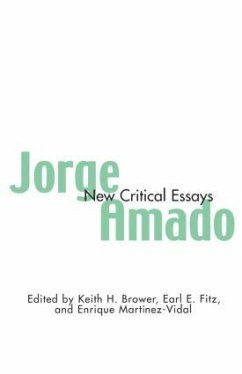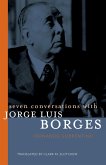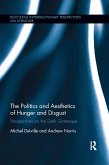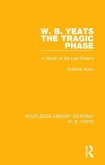Keith Brower / Enrique Martinez-Vidal (eds.)New Critical Essays
Jorge Amado
New Critical Essays
Herausgeber: Fitz, Earl; Martinez-Vidal, Enrique; Brower, Keith
Keith Brower / Enrique Martinez-Vidal (eds.)New Critical Essays
Jorge Amado
New Critical Essays
Herausgeber: Fitz, Earl; Martinez-Vidal, Enrique; Brower, Keith
- Broschiertes Buch
- Merkliste
- Auf die Merkliste
- Bewerten Bewerten
- Teilen
- Produkt teilen
- Produkterinnerung
- Produkterinnerung
First published in 2001. Routledge is an imprint of Taylor & Francis, an informa company.
Andere Kunden interessierten sich auch für
![Seven Conversations with Jorge Luis Borges Seven Conversations with Jorge Luis Borges]() Fernando SorrentinoSeven Conversations with Jorge Luis Borges17,99 €
Fernando SorrentinoSeven Conversations with Jorge Luis Borges17,99 €![Borges and the Politics of Form Borges and the Politics of Form]() Jose Eduardo GonzalezBorges and the Politics of Form69,99 €
Jose Eduardo GonzalezBorges and the Politics of Form69,99 €![Women of Bloomsbury Women of Bloomsbury]() Mary Ann CawsWomen of Bloomsbury46,99 €
Mary Ann CawsWomen of Bloomsbury46,99 €![The Politics and Aesthetics of Hunger and Disgust The Politics and Aesthetics of Hunger and Disgust]() Michel DelvilleThe Politics and Aesthetics of Hunger and Disgust55,99 €
Michel DelvilleThe Politics and Aesthetics of Hunger and Disgust55,99 €![The Environmental Unconscious in the Fiction of Don DeLillo The Environmental Unconscious in the Fiction of Don DeLillo]() Elise MartucciThe Environmental Unconscious in the Fiction of Don DeLillo50,99 €
Elise MartucciThe Environmental Unconscious in the Fiction of Don DeLillo50,99 €![W. B. Yeats W. B. Yeats]() Vivienne KochW. B. Yeats51,99 €
Vivienne KochW. B. Yeats51,99 €![Making Homes in the West/Indies Making Homes in the West/Indies]() Antonia Macdonald-SmytheMaking Homes in the West/Indies62,99 €
Antonia Macdonald-SmytheMaking Homes in the West/Indies62,99 €-
-
-
First published in 2001. Routledge is an imprint of Taylor & Francis, an informa company.
Produktdetails
- Produktdetails
- Verlag: Routledge
- Seitenzahl: 302
- Erscheinungstermin: 19. April 2001
- Englisch
- Abmessung: 216mm x 140mm x 16mm
- Gewicht: 383g
- ISBN-13: 9780815339328
- ISBN-10: 0815339321
- Artikelnr.: 22018546
- Herstellerkennzeichnung
- Libri GmbH
- Europaallee 1
- 36244 Bad Hersfeld
- gpsr@libri.de
- Verlag: Routledge
- Seitenzahl: 302
- Erscheinungstermin: 19. April 2001
- Englisch
- Abmessung: 216mm x 140mm x 16mm
- Gewicht: 383g
- ISBN-13: 9780815339328
- ISBN-10: 0815339321
- Artikelnr.: 22018546
- Herstellerkennzeichnung
- Libri GmbH
- Europaallee 1
- 36244 Bad Hersfeld
- gpsr@libri.de
Keith Brower is Professor of Spanish and Portuguese at Salisbury State University. Enrique Martinez-Vidal is Professor of Spanish and Portuguese at Dickinson College.
Introduction 1. Religion and Revolution: The Allegorical Subtexts of
Capitaes da areia 2. Ambiguity Lost: Jorge Amado's A morte e a morte de
Quincas Berro Dagua 3. Stirking a Balance: Amado and the Critics 4.
Gabriela, Clove and Cinnamon: Rewriting the Discourse of the Native 4.
Malandro Heaven: Amado's Utopian Vision 5. Bitter Harvest: Violent
Oppression in Cacau and Terra do sem fim 6. Dressing Down the Warrior
Maiden: Plot, Perspective and Gender Ideology in Tereza Batista cansada de
guerra 7. the Vox Populi in the Novels of Jorge Amado and John Steinbeck 8.
A Character in Spite of Her Author: Dona Flor Liberates Herself from Jorge
Amado 9. Jorge Amado and the Classical Tradition Aristonphanes in Bahia 10.
Jorge and Zelia Amado's Long Visit to the Pennsylvania State university in
1971: Surprise and Success 11. The Early Jorge Amado 12. From Lundu and
Modinha to Samba de Enredo and MPB: Popular Music and the Fiction of Jorge
Amado 13. Questioning Jorge Amado's Fictional Women of Color: Tereza
Batista as Herione or Victim 14. O Sumico da Santa (The War of the Saints)
: A Postmodern Reconstruction of Racial Dynamics in Contemporary Bahian
Society 15. A Postcolonial Reading of a Colonized Malandro 16. Hybridity
vs. Pluralism: Culture, Race, and Aesthetics in Jorge Amado 17. The
Immanent Imp: Humor in the Later Works of Jorge Amado
Capitaes da areia 2. Ambiguity Lost: Jorge Amado's A morte e a morte de
Quincas Berro Dagua 3. Stirking a Balance: Amado and the Critics 4.
Gabriela, Clove and Cinnamon: Rewriting the Discourse of the Native 4.
Malandro Heaven: Amado's Utopian Vision 5. Bitter Harvest: Violent
Oppression in Cacau and Terra do sem fim 6. Dressing Down the Warrior
Maiden: Plot, Perspective and Gender Ideology in Tereza Batista cansada de
guerra 7. the Vox Populi in the Novels of Jorge Amado and John Steinbeck 8.
A Character in Spite of Her Author: Dona Flor Liberates Herself from Jorge
Amado 9. Jorge Amado and the Classical Tradition Aristonphanes in Bahia 10.
Jorge and Zelia Amado's Long Visit to the Pennsylvania State university in
1971: Surprise and Success 11. The Early Jorge Amado 12. From Lundu and
Modinha to Samba de Enredo and MPB: Popular Music and the Fiction of Jorge
Amado 13. Questioning Jorge Amado's Fictional Women of Color: Tereza
Batista as Herione or Victim 14. O Sumico da Santa (The War of the Saints)
: A Postmodern Reconstruction of Racial Dynamics in Contemporary Bahian
Society 15. A Postcolonial Reading of a Colonized Malandro 16. Hybridity
vs. Pluralism: Culture, Race, and Aesthetics in Jorge Amado 17. The
Immanent Imp: Humor in the Later Works of Jorge Amado
Introduction 1. Religion and Revolution: The Allegorical Subtexts of
Capitaes da areia 2. Ambiguity Lost: Jorge Amado's A morte e a morte de
Quincas Berro Dagua 3. Stirking a Balance: Amado and the Critics 4.
Gabriela, Clove and Cinnamon: Rewriting the Discourse of the Native 4.
Malandro Heaven: Amado's Utopian Vision 5. Bitter Harvest: Violent
Oppression in Cacau and Terra do sem fim 6. Dressing Down the Warrior
Maiden: Plot, Perspective and Gender Ideology in Tereza Batista cansada de
guerra 7. the Vox Populi in the Novels of Jorge Amado and John Steinbeck 8.
A Character in Spite of Her Author: Dona Flor Liberates Herself from Jorge
Amado 9. Jorge Amado and the Classical Tradition Aristonphanes in Bahia 10.
Jorge and Zelia Amado's Long Visit to the Pennsylvania State university in
1971: Surprise and Success 11. The Early Jorge Amado 12. From Lundu and
Modinha to Samba de Enredo and MPB: Popular Music and the Fiction of Jorge
Amado 13. Questioning Jorge Amado's Fictional Women of Color: Tereza
Batista as Herione or Victim 14. O Sumico da Santa (The War of the Saints)
: A Postmodern Reconstruction of Racial Dynamics in Contemporary Bahian
Society 15. A Postcolonial Reading of a Colonized Malandro 16. Hybridity
vs. Pluralism: Culture, Race, and Aesthetics in Jorge Amado 17. The
Immanent Imp: Humor in the Later Works of Jorge Amado
Capitaes da areia 2. Ambiguity Lost: Jorge Amado's A morte e a morte de
Quincas Berro Dagua 3. Stirking a Balance: Amado and the Critics 4.
Gabriela, Clove and Cinnamon: Rewriting the Discourse of the Native 4.
Malandro Heaven: Amado's Utopian Vision 5. Bitter Harvest: Violent
Oppression in Cacau and Terra do sem fim 6. Dressing Down the Warrior
Maiden: Plot, Perspective and Gender Ideology in Tereza Batista cansada de
guerra 7. the Vox Populi in the Novels of Jorge Amado and John Steinbeck 8.
A Character in Spite of Her Author: Dona Flor Liberates Herself from Jorge
Amado 9. Jorge Amado and the Classical Tradition Aristonphanes in Bahia 10.
Jorge and Zelia Amado's Long Visit to the Pennsylvania State university in
1971: Surprise and Success 11. The Early Jorge Amado 12. From Lundu and
Modinha to Samba de Enredo and MPB: Popular Music and the Fiction of Jorge
Amado 13. Questioning Jorge Amado's Fictional Women of Color: Tereza
Batista as Herione or Victim 14. O Sumico da Santa (The War of the Saints)
: A Postmodern Reconstruction of Racial Dynamics in Contemporary Bahian
Society 15. A Postcolonial Reading of a Colonized Malandro 16. Hybridity
vs. Pluralism: Culture, Race, and Aesthetics in Jorge Amado 17. The
Immanent Imp: Humor in the Later Works of Jorge Amado









